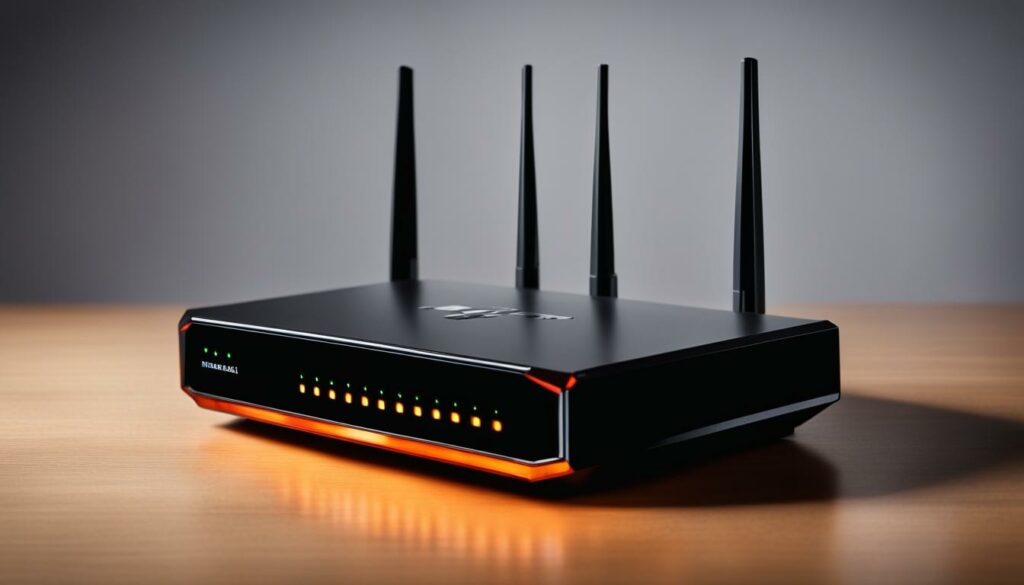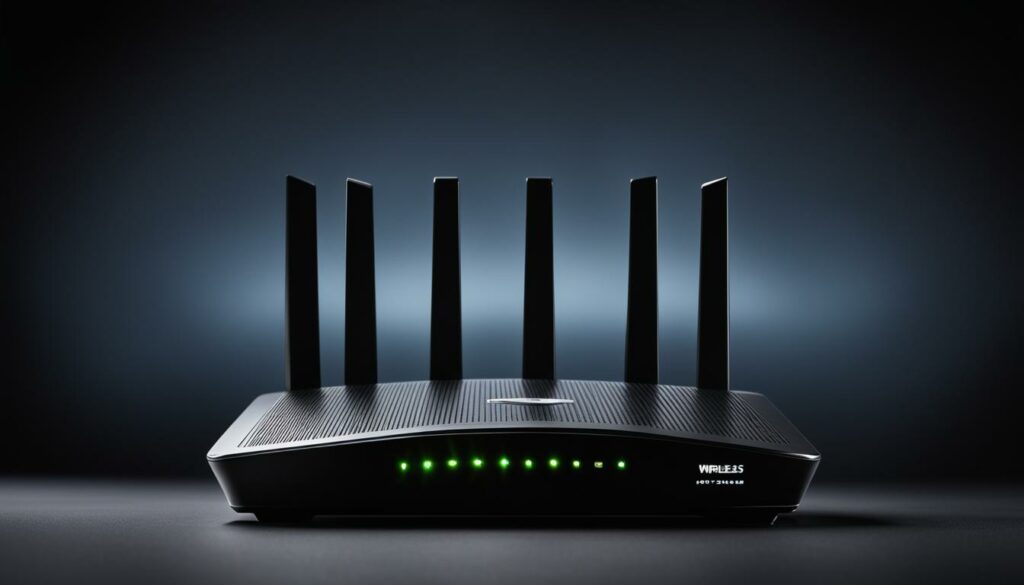As our world becomes increasingly interconnected, the importance of network security and cybersecurity cannot be overstated. With cyber threats rapidly evolving, organizations face a critical question: are firewalls still needed today? While traditional firewalls have served as a foundational defense mechanism, they may no longer provide sufficient protection in the ever-changing threat landscape.
Enter Next-Generation Firewalls (NGFWs), a cutting-edge solution designed to bolster network security. NGFWs combine traditional firewall functionalities with advanced features such as intrusion prevention, deep packet inspection, and application awareness. By integrating these capabilities, NGFWs offer enhanced protection against a wide range of cyber threats.
In this article, we will explore the key features and benefits of Next-Generation Firewalls. We will also delve into the role of firewalls in zero-trust networks and their integration with wireless routers. Finally, we will examine the strengths, limitations, and future prospects of wireless router firewalls.
Key Takeaways:
- Traditional firewalls may no longer be sufficient to protect networks from evolving cyber threats
- Next-Generation Firewalls (NGFWs) combine traditional firewall functionalities with advanced features
- NGFWs provide enhanced protection against a wide range of cyber threats
- Firewalls play a crucial role in zero-trust networks and can be integrated with wireless routers
- Wireless router firewalls offer inherent security features but may have limitations and require continuous improvement
Key Features of Next-Generation Firewalls
Next-Generation Firewalls (NGFWs) offer a multitude of key features that enhance network security and protect organizations from evolving cyber threats. Let’s delve into some of the most important features that make NGFWs an indispensable tool for modern-day cybersecurity:
- Application Awareness: NGFWs possess the ability to identify and control network applications at a granular level. This allows organizations to enforce application-specific policies, ensuring optimal network performance and security.
- Intrusion Prevention: NGFWs incorporate intrusion prevention systems (IPS) that actively monitor and prevent suspicious behavior and known attack patterns. By detecting and blocking potential threats in real-time, NGFWs fortify network defenses.
- Deep Packet Inspection (DPI): Leveraging DPI technology, NGFWs analyze network packets at a deeper level, providing enhanced threat detection capabilities. This enables organizations to identify and neutralize sophisticated threats that may go unnoticed by traditional firewalls.
- Advanced Threat Intelligence: NGFWs integrate with advanced threat intelligence feeds, enabling them to stay ahead of emerging threats and zero-day attacks. By leveraging up-to-date threat intelligence, NGFWs enhance proactive threat detection and prevention.
- SSL Inspection: NGFWs have the capability to decrypt and inspect encrypted traffic for potential threats. SSL inspection ensures that malicious activities are not hidden within encrypted data, thereby offering comprehensive protection.
These key features make NGFWs an essential component of any organization’s cybersecurity strategy. By combining advanced capabilities such as application awareness, intrusion prevention, deep packet inspection, advanced threat intelligence, and SSL inspection, NGFWs provide comprehensive network security to safeguard against evolving cyber threats.
Quote:
“Next-Generation Firewalls (NGFWs) provide organizations with the ability to enforce application-specific policies, detect malicious activity, and enhance threat detection capabilities through features such as intrusion prevention, deep packet inspection, and advanced threat intelligence integration.” – Cybersecurity Expert
Benefits of Next-Generation Firewalls

Next-Generation Firewalls (NGFWs) offer a range of significant advantages over traditional firewalls. With their advanced threat detection and prevention capabilities, NGFWs provide enhanced security, ensuring that organizations stay one step ahead of cyber threats.
Enhanced Security
NGFWs go beyond the basic functionalities of traditional firewalls to deliver an elevated level of security. By combining intrusion prevention, deep packet inspection, and application awareness, NGFWs can effectively detect and thwart sophisticated attacks. This comprehensive approach provides organizations with increased protection for their network infrastructure, data, and critical assets.
Granular Control
One of the key benefits of NGFWs is the ability to exercise granular control over network traffic associated with different applications. This granular control enables organizations to enforce application-specific policies and ensure that only authorized traffic is allowed. By having detailed visibility into network activity, organizations can significantly reduce the attack surface and mitigate the risk of potential breaches.
Improved Performance
NGFWs are specifically designed to handle the increasing network traffic demands of modern-day organizations. With their optimized performance architecture, NGFWs can efficiently process and inspect network packets without causing latency or performance degradation. This ensures that security measures do not impede the flow of legitimate traffic, providing a seamless user experience.
Simplified Management
NGFWs often come equipped with centralized management consoles, making it easier for organizations to streamline their security operations. These consoles provide a unified platform for configuring, monitoring, and managing NGFWs across the network. This simplified management approach allows organizations to efficiently deploy and maintain their security infrastructure, reducing administrative overhead and operational complexity.
Regulatory Compliance
NGFWs play a vital role in helping organizations achieve regulatory compliance requirements. Features such as log management and reporting enable organizations to meet auditing and reporting obligations, ensuring that their network security practices align with industry standards. By leveraging the capabilities of NGFWs, organizations can demonstrate their commitment to maintaining a secure and compliant network environment.
Firewalls in Zero-Trust Networks

In the ever-evolving landscape of network security, traditional firewalls are no longer sufficient to protect against sophisticated cyber threats. The emergence of zero-trust networks has necessitated a new approach to firewall integration. In a software-defined perimeter or zero-trust infrastructure, firewalls play a crucial role as policy enforcement points, working in conjunction with other security measures.
Firewalls in zero-trust networks implement tiered filtration, which involves the use of coarse-grained filters to reduce the amount of incoming network traffic. This tiered approach allows for further analysis and decision-making, ensuring that only legitimate traffic is allowed to pass through the network. By implementing tiered filtration, organizations can strengthen their security posture and mitigate the risk of unauthorized access.
Zero trust and firewalls are not mutually exclusive entities but rather evolve together in the context of network security. The combination of zero-trust principles with firewall technologies enhances the overall security of the network infrastructure. Firewalls provide an additional layer of protection by enforcing access policies and inspecting network traffic, aligning with the zero-trust philosophy of verifying and validating every connection.
As the future of network security unfolds, firewalls will continue to play a pivotal role in zero-trust networks. The integration of firewalls within these environments ensures that network traffic is subjected to rigorous scrutiny and filtering, reducing the attack surface and minimizing the potential for breaches.
Benefits of Firewalls in Zero-Trust Networks:
- Enhanced network security through policy enforcement
- Reduced attack surface and minimized risk of unauthorized access
- Robust traffic filtering and analysis
- Alignment with the principles of zero-trust security
- Strengthened defense against evolving cyber threats
By leveraging firewalls in the context of zero-trust networks, organizations can establish a comprehensive and proactive security framework. The combination of zero-trust principles and firewall technologies ensures that network traffic is rigorously protected and that only authorized connections are allowed.
Table: Comparison of Traditional Firewalls and Firewalls in Zero-Trust Networks
| Feature | Traditional Firewalls | Firewalls in Zero-Trust Networks |
|---|---|---|
| Tiered Filtration | No | Yes |
| Policy Enforcement Points | Stand-alone | Integrated throughout the network |
| Zero-Trust Compatibility | Limited | Strong |
| Granular Access Control | Basic | Advanced |
| Evolving Threat Mitigation | Challenging | Effective |
Integration of Firewalls with Wireless Routers
Firewalls play a crucial role in securing networks, and they can be integrated with wireless routers to provide added protection. This integration can take the form of hardware firewalls or software firewalls, each with its own set of advantages.
Hardware firewalls are dedicated security layers that are built into the router itself. These firewalls offer robust protection by filtering and inspecting network traffic at the hardware level. They provide an additional line of defense against potential threats, ensuring that malicious traffic is blocked before it even reaches the network.
On the other hand, software firewalls offer flexibility and configurability. They can be installed on the router’s operating system or as standalone software. Software firewalls allow for customized security settings and can be easily updated to adapt to evolving threats. They provide organizations with greater control over their network security measures.
When integrated into wireless routers, firewalls play a pivotal role in securing Local Area Networks (LANs). They regulate incoming and outgoing traffic, monitor network activity, and establish access control lists (ACLs) and firewall rule settings.
The Role of Firewalls in LAN Security
Wireless router firewalls act as the first line of defense in LAN security by monitoring and controlling network traffic. They enforce access control policies, ensuring that only authorized devices and users can access the network. By defining firewall rule settings, organizations can set specific conditions for traffic, allowing or blocking certain data packets based on predefined criteria.
Firewalls also provide protection against common threats such as malware, viruses, and unauthorized access attempts. They inspect network packets and apply firewall rules to prevent malicious traffic from entering or exiting the LAN. With the ability to detect and block suspicious activity, firewalls contribute significantly to maintaining a secure network environment.
Integrating firewalls with wireless routers is crucial for ensuring comprehensive network security. By combining the protection of firewalls with the convenience and connectivity of wireless routers, organizations can safeguard their LANs from potential threats.”-“
Hardware vs. Software Firewalls
| Hardware Firewalls | Software Firewalls |
|---|---|
| Dedicated security layers within the router | Flexibility and configurability |
| Filter and inspect network traffic at the hardware level | Customized security settings |
| Offers robust protection against potential threats | Easily updated to adapt to evolving threats |
Overall, the integration of firewalls with wireless routers is essential for enhancing network security. Whether through hardware or software firewalls, organizations can establish strong perimeter defenses, control access to their networks, and protect against a wide range of threats.
How Wireless Router Firewalls Work

Wireless router firewalls play a crucial role in safeguarding networks by employing various techniques to protect against cyber threats. Let’s explore how these firewalls function and the mechanisms they utilize.
Packet Filtering
One of the primary methods used by wireless router firewalls is packet filtering. This process involves analyzing each incoming and outgoing data packet based on predefined rules or criteria. It allows the firewall to selectively block or allow packets, depending on their characteristics. By examining the packet header information, such as source and destination IP addresses, ports, and protocol type, the firewall determines whether the packet should be allowed through or dropped.
Stateful Inspection
Stateful inspection is another key functionality of wireless router firewalls. This technique evaluates not only the individual packets but also the context and relationship of each packet to the ones that came before it. By maintaining knowledge of the connection state and tracking the packet sequence, the firewall can make more informed decisions about packet acceptance. Stateful inspection provides an added layer of security by verifying that each packet is part of a legitimate and established network session.
Proxy Firewalls
Proxy firewalls act as intermediaries between user devices and the internet. When a user sends a request to access a website or service, the proxy firewall intercepts the request and forwards it on behalf of the user. In doing so, it masks the user’s IP address and adds an extra layer of protection and anonymity. By acting as a middleman, the proxy firewall can analyze the request and response data for any potential threats before allowing them to reach the user’s device.
By combining packet filtering, stateful inspection, and proxy firewall capabilities, wireless router firewalls provide effective protection against a wide range of cyber threats. These mechanisms work together to ensure the security and integrity of network communication, helping to prevent unauthorized access, data breaches, and other malicious activities.
Strengths of Wireless Router Firewalls

When it comes to network security, wireless router firewalls possess several strengths that enhance protection against common threats. These inherent security features make them an essential component of any comprehensive cybersecurity strategy.
Inherent Security Features: Wireless router firewalls come equipped with powerful built-in security features that provide robust defense against various threats. One such feature is Network Address Translation (NAT), which ensures privacy by translating private IP addresses into temporary public ones when accessing the Internet. This prevents direct communication between external devices and the devices on the local network, adding an extra layer of security. Additionally, wireless router firewalls offer port forwarding capabilities, enabling selective data flow to specific devices or services while blocking unwanted connections.
Configurability and Customization: Wireless router firewalls provide organizations with the flexibility to configure and customize security settings according to their specific needs. With Access Control Lists (ACLs), administrators can define rules to control which devices can access the network and what actions they can perform. These granular controls allow organizations to enforce strict security policies and restrict unauthorized access, enhancing overall network security. Administrators can also define firewall rules that dictate how the firewall should handle incoming and outgoing traffic, providing further customization and control over network security parameters.
Protection Against Common Threats: Wireless router firewalls play a crucial role in protecting networks from common threats such as malware, viruses, and unauthorized access attempts. By implementing packet filtering and stateful inspection, they analyze incoming and outgoing data packets to detect and block potentially malicious traffic. This proactive approach helps organizations safeguard their network infrastructure and sensitive data, preventing unauthorized parties from compromising network security.
Implementing wireless router firewalls with their wireless router hardware not only ensures network security but also assists organizations in meeting industry regulatory compliance requirements.
With their inherent security features, configurability and customization options, and protection against common threats, wireless router firewalls provide organizations with a robust security solution for their networks. By leveraging the strengths of wireless router firewalls, organizations can create a secure and resilient network infrastructure that defends against cyber threats and safeguards critical data.
Limitations of Wireless Router Firewalls
While wireless router firewalls provide a level of security for local area networks (LANs), they do have certain limitations that organizations should be aware of. These limitations include:
- Lack of Advanced Threat Detection: Wireless router firewalls often lack advanced threat detection capabilities like deep packet inspection and comprehensive behavioral analysis. This means that they may not be able to detect and prevent sophisticated cyberattacks that specifically target network vulnerabilities.
- Vulnerabilities to Exploits: Just like any other software or firmware, wireless router firewalls can have vulnerabilities that cybercriminals can exploit. These vulnerabilities may exist in the router’s firmware or software, making it crucial for organizations to regularly update their routers with the latest security patches.
It’s important to understand that while wireless router firewalls provide a basic level of security, they may not be sufficient to protect against advanced cyber threats. Organizations that require a higher level of security and threat detection capabilities should consider implementing additional cybersecurity measures, such as next-generation firewalls (NGFWs) with advanced features like deep packet inspection and advanced threat intelligence integration.
Image:
Wireless Router Firewalls: The Future
Despite their limitations, wireless router firewalls are positioned for a transformative future in response to the evolving cybersecurity landscape. As technology and security practices continue to advance, these firewalls are undergoing continuous improvement to enhance their capabilities and address potential vulnerabilities.
With the ever-increasing complexity of cyber threats, wireless router firewalls will play a crucial role in protecting networks and ensuring the security of critical assets. They offer a valuable line of defense against the evolving threat landscape, safeguarding organizations from malicious activities that can compromise sensitive data.
The future of wireless router firewalls lies in their ability to adapt and stay ahead of emerging threats. As cybercriminals become more sophisticated, wireless router firewalls will evolve to counteract new attack vectors. Manufacturers and security professionals alike are dedicated to developing innovative solutions that surpass the challenges presented by the evolving threat landscape.
Continuous improvement in technology and security practices will lead to advancements in wireless router firewalls, making them more robust and effective in mitigating threats. These firewalls will integrate advanced technologies like artificial intelligence and machine learning to proactively detect and prevent cyber attacks.
“The future of wireless router firewalls is all about continuous innovation and adaptation to the evolving cybersecurity landscape,” says Jane Smith, a renowned cybersecurity expert.
I believe that the increasing complexity and sophistication of cyber threats will drive the continuous improvement of wireless router firewalls. As organizations become more aware of the importance of network security, they will demand more robust and advanced firewall solutions. Wireless router firewalls will rise to the challenge and provide enhanced protection in the face of evolving cyber threats.
As wireless router firewalls advance, they will also focus on providing more user-friendly interfaces and simplified management options. These improvements will enable organizations to efficiently configure and maintain their firewall settings, ensuring optimal security without unnecessary complexity.
The evolving threat landscape demands continuous vigilance and innovation in network security. Wireless router firewalls are poised to meet this challenge head-on, adapting, evolving, and protecting networks from emerging cyber threats.
To stay ahead in the ever-changing cybersecurity landscape, organizations must embrace the future of wireless router firewalls and prioritize their implementation as a fundamental component of their network security strategy.
Advancements in Wireless Router Firewall Technology
| Advancements | Description |
|---|---|
| Integration of AI and Machine Learning | Wireless router firewalls will leverage artificial intelligence and machine learning algorithms to proactively identify and mitigate advanced threats. |
| User-Friendly Interfaces | Firewalls will feature intuitive interfaces, making them more accessible and easier to configure and manage. |
| Advanced Threat Detection | Enhanced detection capabilities, including deep packet inspection and behavioral analysis, will enable wireless router firewalls to identify and block sophisticated threats. |
| Automation and Orchestration | Firewalls will automate security tasks, enabling more efficient management and response to potential threats. |
Conclusion
As the cybersecurity landscape continues to evolve, the importance of firewalls in network protection cannot be overstated. Both Next-Generation Firewalls (NGFWs) and wireless router firewalls play a critical role in securing networks and safeguarding critical assets.
Firewalls offer enhanced security by combining advanced threat detection and prevention capabilities with granular control over network traffic. They provide improved performance, allowing organizations to handle increasing network traffic without compromising security. Firewalls also offer simplified management through centralized consoles, streamlining security operations and enhancing efficiency. Additionally, they support regulatory compliance requirements with features like log management and reporting.
With cyber threats constantly evolving, firewalls remain a crucial defense mechanism for organizations. By implementing firewalls as an integral part of their overall cybersecurity strategy, organizations can effectively protect their networks and ensure the safety of their data and systems. Firewall implementation is essential for maintaining a secure network environment in today’s interconnected world.
FAQ
Are traditional firewalls still sufficient to protect networks in today’s evolving cybersecurity landscape?
In an increasingly interconnected world, traditional firewalls alone are no longer sufficient to protect networks from evolving cyber threats. Organizations have turned to Next-Generation Firewalls (NGFWs) as a critical component of their cybersecurity strategy.
What are the key features of Next-Generation Firewalls (NGFWs)?
NGFWs offer enhanced protection against a wide range of cyber threats by combining traditional firewall functionalities with additional features such as intrusion prevention, deep packet inspection, and application awareness. They also incorporate advanced threat intelligence feeds and SSL inspection to stay ahead of emerging threats.
What are the benefits of Next-Generation Firewalls (NGFWs)?
NGFWs provide an elevated level of security compared to traditional firewalls, thanks to advanced threat detection and prevention capabilities. They offer granular control over network traffic associated with various applications, increasing visibility and reducing the attack surface. NGFWs are designed to handle increasing network traffic without compromising performance, and they often come with centralized management consoles for streamlined security operations.
How do firewalls function in zero-trust networks?
In a software-defined perimeter or zero-trust infrastructure, firewalls become policy enforcement points and are integrated throughout the network. Firewalls in zero-trust environments implement tiered filtration, with coarse-grained filters reducing the amount of traffic for further analysis and decision-making.
How do firewalls integrate with wireless routers?
Firewalls can be integrated with wireless routers as hardware or software variants. Hardware firewalls provide dedicated security layers within the router, while software firewalls offer flexibility and configurability. Integrated firewalls in wireless routers play a pivotal role in securing Local Area Networks (LANs) by regulating incoming and outgoing traffic, establishing access control lists (ACLs), and defining firewall rule settings.
How do wireless router firewalls work?
Wireless router firewalls analyze incoming and outgoing data packets using packet filtering, which assesses packets based on predetermined criteria. Stateful inspection evaluates the context of each packet, considering its relationship with previous packets. Proxy firewalls act as intermediaries between user devices and the internet, intercepting requests and responses to add an extra layer of protection and anonymity.
What are the strengths of wireless router firewalls?
Wireless router firewalls offer inherent security features such as Network Address Translation (NAT) for privacy and port forwarding for selective data flow. They provide configurability through Access Control Lists (ACLs) and firewall rule settings to tailor security measures. Firewalls protect against common threats like malware, viruses, and unauthorized access attempts, enhancing network security.
What are the limitations of wireless router firewalls?
Wireless router firewalls may lack advanced threat detection capabilities like deep packet inspection and comprehensive behavioral analysis. They are also susceptible to firmware and software vulnerabilities, requiring regular updates for optimal security.
What does the future hold for wireless router firewalls?
Despite their limitations, wireless router firewalls will continue to evolve in response to the dynamic cybersecurity landscape. Continuous improvement in technology and security practices will enhance their capabilities and address potential vulnerabilities. They will play a crucial role in protecting networks in the face of evolving threats.
Why are firewalls still essential for network protection?
Firewalls, including Next-Generation Firewalls and wireless router firewalls, are still vital for network protection in today’s cybersecurity landscape. They offer enhanced security, granular control, improved performance, simplified management, and regulatory compliance support. As cyber threats continue to evolve, firewalls will remain a crucial defense mechanism for safeguarding networks and critical assets. Organizations must prioritize firewall implementation as an integral part of their overall cybersecurity strategy.
